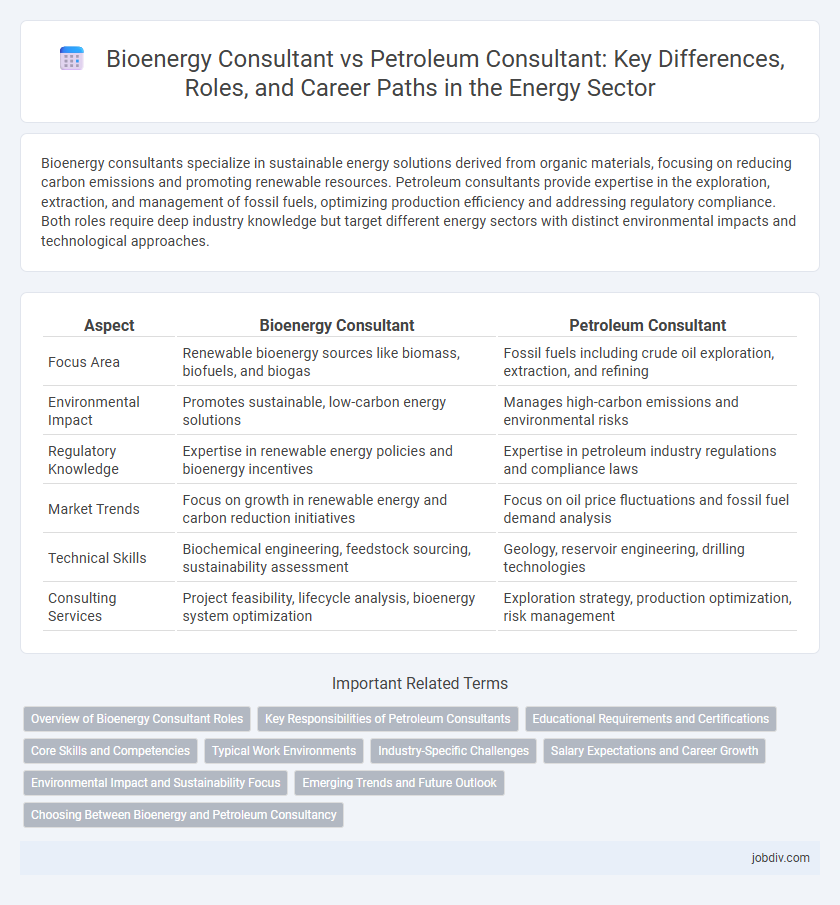Bioenergy consultants specialize in sustainable energy solutions derived from organic materials, focusing on reducing carbon emissions and promoting renewable resources. Petroleum consultants provide expertise in the exploration, extraction, and management of fossil fuels, optimizing production efficiency and addressing regulatory compliance. Both roles require deep industry knowledge but target different energy sectors with distinct environmental impacts and technological approaches.
Table of Comparison
| Aspect | Bioenergy Consultant | Petroleum Consultant |
|---|---|---|
| Focus Area | Renewable bioenergy sources like biomass, biofuels, and biogas | Fossil fuels including crude oil exploration, extraction, and refining |
| Environmental Impact | Promotes sustainable, low-carbon energy solutions | Manages high-carbon emissions and environmental risks |
| Regulatory Knowledge | Expertise in renewable energy policies and bioenergy incentives | Expertise in petroleum industry regulations and compliance laws |
| Market Trends | Focus on growth in renewable energy and carbon reduction initiatives | Focus on oil price fluctuations and fossil fuel demand analysis |
| Technical Skills | Biochemical engineering, feedstock sourcing, sustainability assessment | Geology, reservoir engineering, drilling technologies |
| Consulting Services | Project feasibility, lifecycle analysis, bioenergy system optimization | Exploration strategy, production optimization, risk management |
Overview of Bioenergy Consultant Roles
Bioenergy consultants specialize in developing sustainable energy solutions by analyzing biomass resources, assessing biofuel production processes, and advising on renewable energy policies to reduce carbon emissions. Their roles often include conducting feasibility studies for bioenergy projects, optimizing supply chains for biomass feedstocks, and integrating bioenergy systems with existing infrastructure. Unlike petroleum consultants who focus on fossil fuel extraction and market analysis, bioenergy consultants emphasize environmental impact, circular economy principles, and innovation in renewable technologies.
Key Responsibilities of Petroleum Consultants
Petroleum consultants specialize in evaluating exploration and production projects, conducting reservoir analysis, and optimizing hydrocarbon extraction processes to maximize output. They provide technical guidance on drilling operations, regulatory compliance, and market trends for oil and gas industries. Their expertise includes risk assessment, economic feasibility studies, and advising on environmental impact mitigation in petroleum development.
Educational Requirements and Certifications
Bioenergy consultants typically require a strong background in environmental science, renewable energy engineering, or sustainable development, often holding degrees such as a Bachelor's or Master's in these fields, along with certifications like the Certified Energy Manager (CEM) or Renewable Energy Professional (REP). Petroleum consultants usually possess degrees in petroleum engineering, geology, or chemical engineering, complemented by industry-specific certifications such as the Professional Engineer (PE) license or certifications from the Society of Petroleum Engineers (SPE). Both roles demand continuous education to stay current with evolving technologies and regulatory standards in the energy sector.
Core Skills and Competencies
A Bioenergy Consultant specializes in renewable energy technologies, biomass conversion processes, and sustainability assessment, possessing expertise in life cycle analysis and environmental impact reduction. A Petroleum Consultant excels in hydrocarbon exploration, reservoir engineering, and petroleum production optimization, with strong skills in geoscience data interpretation and regulatory compliance. Both roles require analytical problem-solving and project management, but Bioenergy Consultants focus on green energy innovation while Petroleum Consultants emphasize fossil fuel extraction efficiency.
Typical Work Environments
Bioenergy consultants primarily work in renewable energy firms, research institutions, and government agencies focused on sustainable energy solutions. Petroleum consultants operate mostly within oil and gas companies, refineries, and regulatory bodies overseeing fossil fuel extraction and production. Both roles may require site visits, but bioenergy consultants often engage with agricultural sectors and environmental projects, whereas petroleum consultants concentrate on drilling sites and petrochemical facilities.
Industry-Specific Challenges
Bioenergy consultants navigate challenges such as feedstock variability, sustainable harvesting, and integration of biomass conversion technologies within circular economies. Petroleum consultants address industry-specific issues involving volatile crude oil prices, regulatory compliance on emissions, and optimization of extraction and refining processes amid shifting global energy demands. Both roles require deep expertise in environmental impact assessments and adaptation to evolving energy policies that influence operational strategies in their respective sectors.
Salary Expectations and Career Growth
Bioenergy consultants typically earn competitive salaries driven by the growing demand for renewable energy expertise, often ranging from $70,000 to $120,000 annually depending on experience and region. Petroleum consultants, while traditionally commanding higher salaries averaging between $80,000 and $150,000, face slower career growth due to industry volatility and regulatory pressures. Career growth in bioenergy shows strong potential fueled by global sustainability trends, whereas petroleum consulting may see limited expansion as markets gradually shift towards cleaner energy alternatives.
Environmental Impact and Sustainability Focus
Bioenergy consultants prioritize renewable resources and carbon-neutral energy solutions, significantly reducing greenhouse gas emissions compared to fossil fuels. Petroleum consultants focus on optimizing extraction and refining processes but face challenges related to environmental pollution and resource depletion. Emphasizing sustainability, bioenergy experts advocate for circular economy principles and lifecycle assessments to minimize ecological footprints.
Emerging Trends and Future Outlook
Bioenergy consultants drive innovation by focusing on sustainable biomass conversion technologies, carbon neutrality, and integrating biofuels with circular economy models to address climate change challenges. Petroleum consultants concentrate on optimizing extraction through enhanced oil recovery, digitalization, and transitioning strategies that balance fossil fuel demand with regulatory pressures. Emerging trends highlight bioenergy's rapid growth potential in renewable energy portfolios while petroleum experts navigate volatility with technological advancements and strategic diversification.
Choosing Between Bioenergy and Petroleum Consultancy
Choosing between a bioenergy consultant and a petroleum consultant hinges on the project's sustainability goals and regulatory compliance requirements. Bioenergy consultants specialize in renewable biomass, biofuels, and carbon reduction strategies, optimizing energy production with lower environmental impact. Petroleum consultants focus on fossil fuel extraction, refining, and market analysis, emphasizing cost efficiency and hydrocarbon resource management in conventional energy sectors.
Bioenergy Consultant vs Petroleum Consultant Infographic

 jobdiv.com
jobdiv.com